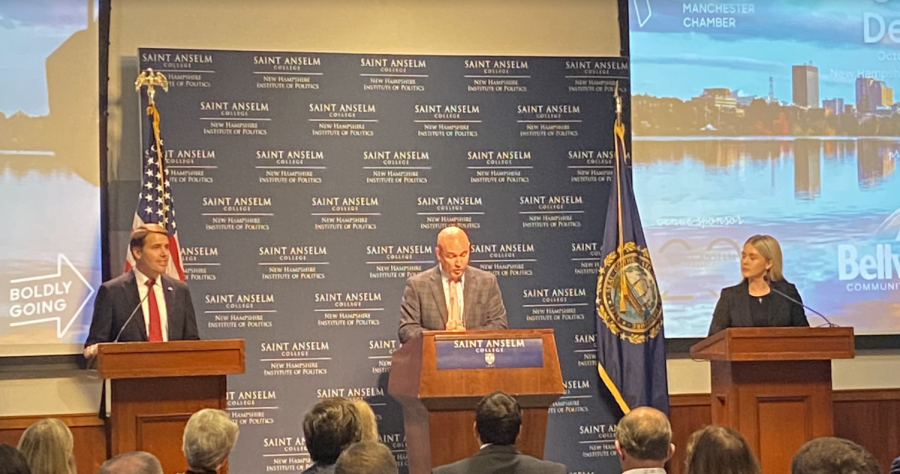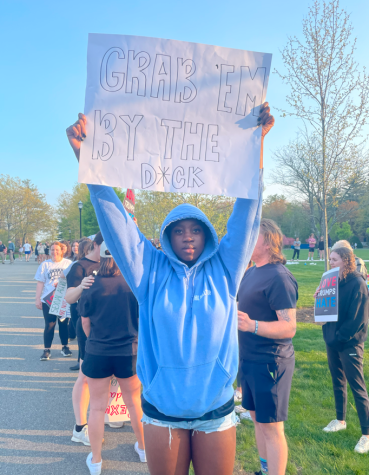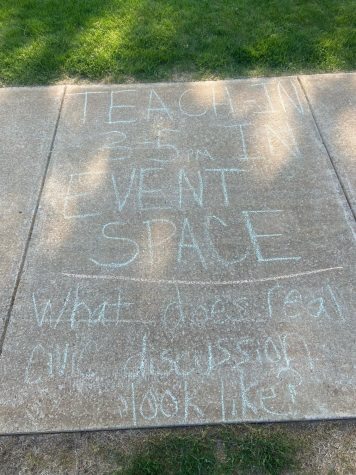Leavitt, Pappas face off at heated debate; ’19 grad seeks incumbent’s seat in US House
Congressional candidates Karoline Leavitt and Chris Pappas at NHIOP for Greater Manchester Chamber of Commerce debate moderated by Scott Spradling.
November 3, 2022
Congressional candidates Karoline Leavitt and Chris Pappas arrived at the New Hampshire Institute of Politics on October 25 to face off in a heated debate. The debate, hosted by the Greater Manchester Chamber of Commerce, predominantly focused on political issues pertaining to New Hampshire business and economics.
One of the few things the two candidates have in common is that they both were raised in New Hampshire small business families. They emphasized how this experience drives their care for the community and inspires them to work hard to support local economies.
Is this where the similarities end? Beginning with their opening statements and continuing through to their closing, the two fired continual shots at each other.
In her opening, Leavitt called Pappas a “Partisan problem creator” due to inflation and skyrocketing energy costs during his latest Congressional term. Throughout the debate, she called him out for “voting with Biden and Pelosi 100% of the time” and argued that his past actions do not support the level of bipartisan efforts he claimed to have pursued. Pappas denied this accusation, claiming that he has worked for bipartisan cooperation on items such as the The Infrastructure Investment and Jobs Act of 2021.
Pappas’ main argument against Leavitt was her extreme Republican views, calling her “the most radical candidate we’ve seen.” He emphasized that she is an “election denier” in regards to the 2020 Presidential Election and the event of the insurrection on the U.S Capitol Building on January 6th 2021. Aside from disagreement on economic issues discussed during the debate, Pappas criticized Leavitt’s support of the overturning of Roe v. Wade and her views on abortion.
Questions in the debate centered around important state economic issues, such as inflation, the housing and workforce crises, healthcare, and energy policy. Leavitt cited inflation as the greatest issue facing New Hampshire small businesses today. “In 2018 inflation was 2.4 percent, today it’s 8.2 percent,” explained Leavitt. She argued that the Democratic administration has worsened costs and Pappas’ vote on the Inflation Act last year increased inflation. Pappas said that the Inflation Act is a “balanced approach to how we lower costs.” Leavitt retorted that spending more money is not the solution for lowering inflation; “that’s not how the economy works,” she said.
In an effort to introduce a bit of light-hearted humor into the heated debate, moderator Scott Spradling asked the candidates what their favorite ice cream flavor is; Leavitt favors chocolate, Pappas favors Oreo. The cool did not last long, as both candidates once again used their closing statements to reduce the credibility of their opponent while posing themselves as the better choice.
The results of this election will decide which candidate will represent the New Hampshire 1st district, which includes Saint Anselm College. Members of the NHIOP Student Ambassador program had the opportunity to get in on the action for this event. Ambassador Program Chair Maeve McAllister and Ambassador Jacob Akey attended and worked the debate.
Chris Pappas and Karoline Leavitt are both from the Manchester area, making this specific race even more local. McAllister highlights that “their families both owned small businesses. They both knew so much about the area and the people they were representing. It was great to see how passionate they both were.” Multiple Saint Anselm students called the economy the number one issue in this election, and both candidates have a small business background with deep ties to this community.
Many Saint Anselm students are aware of this election due to the negative ad campaigns being run by both candidates. A group of politics majors acknowledged that negative ads are annoying and sometimes exaggerated, but no one could doubt their effectiveness. Each student claimed to be more aware of who Karoline Leavitt was due to the negative ads against her than they were aware of anything productive Chris Pappas had done in congress.
These debates are an excellent opportunity for Saint Anselm students to increase their civic engagement and knowledge of national political issues. NHIOP allows its ambassadors to cultivate unique relationships with candidates, their staff, and TV staff depending on the job you are assigned. “Some ambassadors are greeting the candidates and their staff at the door, whereas others are working with the TV crews and the press to ensure everything is set up correctly. In most situations, the candidates will make time to talk to all of the ambassadors, which is a great opportunity for all of us,” explained McCallister.
This is a close race; according to a WMUR poll, Pappas is leading Leavitt by an 8-point margin, with 7% of voters undecided. Akey described the atmosphere of this debate, saying, “you could really feel the tension in the room because it is such a close race. People are taking it very seriously and listening very intently to what each candidate has to say.” McAllister’s pitch to vote in this election is simple, “your voice does matter. Many times, people feel that in the grand scheme of politics, their vote will not make an impact. But in reality, every vote truly does count. This was mentioned at the debate yesterday-that your voice and vote do truly matter.”
The election will be held on Tuesday, November 8th. New Hampshire offers same-day voter registration. To register, the required documents are proof of your identity, age, citizenship, and residence. This can include a driver’s license or a birth certificate and a document from the school you attend showing that you live in campus housing. A document issued by the school that has your name and the address (on or off campus) where you live fills the requirement.












